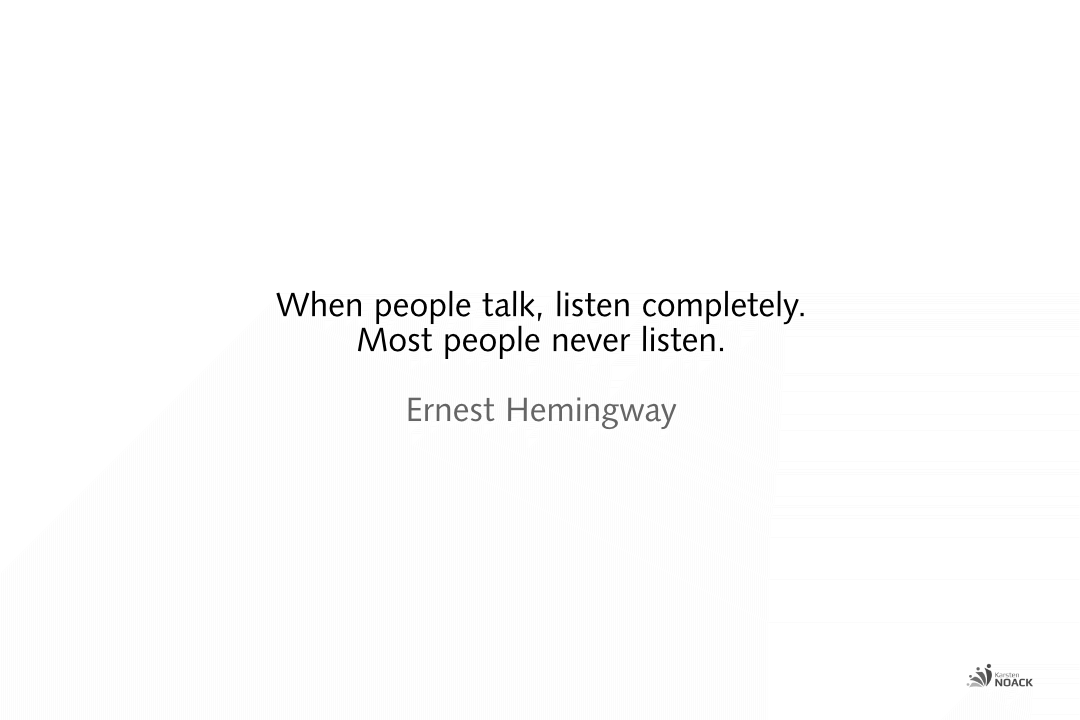Are you a good listener? 15 tips for active listening.
You can win more friends with your ears than you can with your mouth
Active listening
Most people appreciate a good listener, but most prefer to speak for themselves rather than listen. Active listening can be easy, the article tells you how.
Overview
To listen closely and reply well is the highest perfection we are able to attain in the art of conversation.
François de La Rochefoucauld
Listen closely
Hearing more than talking – that’s what nature teaches us:
It gave us two ears, but only one tongue.
Gottfried Keller
Being a good listener can help you to see the world through the eyes of others. It enriches your understanding and expands your capacity for empathy. Listening increases your contact with the outside world by helping you improve your communication skills.
What do you think about the next saying?
You can win more friends with your ears than you can with your mouth.
Listening leads to insights
Good listening skills can provide you with a deeper level of understanding about others and their situation. It helps you to choose your communication style. It tells you what words are best to use or which words to avoid.
Hearing isn’t enough
Being a good listener does not come easy for some of us. Listening is not the same as hearing. It means being aware of both verbal and non-verbal messages. Your ability to listen effectively depends on the degree to which you perceive and understand these messages. And it massively depends on the ability to build rapport.
Active listening
Most people appreciate a good listener. But in practice, most people prefer to speak for themselves rather than listen to others. It is probably not so easy for everyone to listen to other people. But it is worthwhile to pay honest attention to those you are talking to.
Active listening does not turn anyone into a passive person who patiently follows endless explanations without ever getting a chance to speak for himself. Active listening helps to improve communication in general and to make one’s messages heard. Genuine listening is the best way to gain trust and sympathy and to build relationships.
15 tips for active listening
The art of conversation lies in listening, and here is how:
1. Pay attention to your mental state
If the state of mind is too agitated, listening won’t work. So, first, make sure that they are mentally ready.
2. Read between the lines
A large part of communication is non-verbal. Keep an eye on the body language of your interlocutor. While you are listening, your brain only needs a small part of its capacity. The rest is free to formulate an answer and listen better.
3. Pay attention to your body language
Especially less good and impatient listeners are often too busy to speak. And then it easily happens that the body language communicates something different from intended. There is a restless sliding back and forth on the chair, arms or legs crossed, clearing the throat. It is precisely the signals of impatience that do not encourage us to continue talking, but interrupt thoughts that otherwise take place.
4. Avoid distractions
You cannot truly listen to anyone and do anything else at the same time. It helps to put the smartphone aside, to turn it off quietly, to be completely attentive. Choosing a suitable environment also makes it easier for everyone involved to concentrate.
5. Never interrupt
One of the most sincere forms of respect is listening to what another has to say. The interruption of the interlocutor or even the completion of his sentences is disrespectful.
6. Ask questions
It makes sense to ask reflective questions, not only to check whether you have understood everything correctly. Asking questions helps to formulate questions and answers in a more targeted way. It is therefore worth asking questions in between.
7. Consider the body language of the interlocutor
Pay attention to the body language of your counterpart. Register micro gestures or other clues, such as nervous bouncing of the foot under the table. In some situations, you can even respond to your observations. If you do this cautiously, the person you are talking to will be more likely to open up, because they will feel taken seriously, and you will enjoy more trust.
8. Keep eye contact
With your eye contact, you signal interest and that you are with the thing.
9. Avoid justification
Even experienced listeners run the risk of switching off as soon as their ideas and convictions are questioned or criticized. In this situation, cross-pollinating and formulating justifiable answers instead of listening misses information, insight, and the chance to defuse emerging conflicts.
10. Rephrasing
Elegant paraphrasing is the perfect way to solve problems or make plans. Estimate what your conversation partner thinks or feels, and briefly summarize what has already been saying. Show empathy.
11. Taking breaks
Take a break. For example, to absorb what has been said and think about it. You will appear more deliberate and give better answers later.
Who makes a short break before answers, makes it easier for the interlocutor to add something to his statement. Before each answer, count up to four in your head until you automatically take the breaks.
12. Don’t be a know-it-all
A good listener is interested in long-term and viable solutions, rather than quick effects that only flatter his ego. Avoid advice, especially unsolicited advice. Everything else is latently intrusive and as if you were a know-it-all.
13. Enjoy the silence
If you make listening and observation of your occupation, you will gain much more than you can by talking. Listen longer than you talk. People who practice this are perceived as more intelligent and sympathetic.
14. Hearing what isn’t said
One of the most interesting in communication is hearing what isn’t said.
15. Practice, practice, practice
As simple as listening may seem, doing it well, takes sincere effort and lots of practice. Do you want to be someone that others want to talk to? If you want to know how to be a good listener, learn more about it.
Be ready for important conversations and negotiations
Communication can be easy. But often it is not. Sometimes we say one thing and then realize later, based on the other person's reaction, that they were talking to someone else. With the best will in the world, I didn't say that. - Or did I?
More or less consciously, conversations are about convincing other people of something - be it a special offer, your personality, a perspective, or a necessity. If this doesn't happen quickly enough, and above all, if it isn't precise and vivid, the other person quickly loses interest, and we lose the hoped-for opportunity. - The conversation has failed.
You can let me help you prepare for your meetings and negotiations (to be on the safe side: no legal advice!). Find out how you and your message are perceived (arguments, body language, language, voice, and much more). I will train you in effective tools and communication strategies. Develop your psychological skills, learn to stay calm, act confidently, remain authentic, and ultimately convince.
Just ask me personally
Please post any questions that may be of interest to other readers in the comments. Looking for professional help?
If you are interested in coaching, training or consulting, if you have organizational questions, or if you want to make an appointment, you can reach me best via this contact form (you can choose whether you want to enter your personal data) or via e-mail (mail@karstennoack.com). The privacy policy can be found here.
Transparency is important. That is why you will find answers to frequently asked questions already here, for example about me (profile), the services, the fees and getting to know me. If you like what you see, I look forward to working with you.
Remarks:
In the address bar of your browser, the URL should begin with "https://www.karstennoack.com/...". This indicates a secure connection (SSL). Whether you enter your real name is up to you.
Frequently asked questions
Why is active listening important?
Active listening is important when communicating because it ensures that you engage with the person you are talking to in a positive way. It also makes the other person feel heard and valued. This skill is the foundation for a successful conversation in any setting, whether at work, at home, or in social situations.
What is active listening?
Active listening, as the name suggests, means active attention. It means concentrating fully on what is being said and not just passively listening to the speaker’s acoustic message. It requires paying attention with all the senses, focusing fully on the speaker, actively showing verbal and nonverbal signs of listening.
What is the purpose of active listening?
Active listening helps to build trust and understand other people’s situations and feelings. This, in turn, enables one to offer support and empathy. Unlike critical listening, active listening is about understanding, not responding. The goal is to listen and affirm the other person and inspire them to solve their problems.
How can I improve my active listening skills?
There are many ways to improve your active listening. You can practice in coaching sessions, trainings and everyday situations.
Present the benefits in the beginning of your pitch
There are many strategies to consider in opening your pitch. Think about it twice, because those first minutes can make or break you.
You should know Godwin’s Law in order not to fall into the trap
What is Godwin’s Law? And how does it relate to everyday communication, speeches, and presentations?
What effort and cost for the preparation of a conversation or negotiation are justified?
If you expect something from a conversation, it pays off to prepare accordingly. With a good conversation, a lot can be achieved and investments are worthwhile. So far so good. Which effort exactly is worthwhile?
Professional impact analysis: How are you perceived by other people?
How do you actually affect people in conversations, speeches and presentations, in interviews? Professional feedback helps. What insights does an impact analysis offer you?
17 tips for facial expressions in speeches and presentations
This article deals with what it is worth paying attention to as a speaker concerning facial expressions.
These 20+ conversation tips let you talk without interruption!
What kind of people don’t let you finish your talk? In a good conversation, everyone has his part. Everyone can talk and let the other talk. But why are some people interrupted so often and what can be done about it? Here are some tips to reduce the likelihood to be interrupted while you speak.
Public speaking: Keeping it simple doesn’t mean you’re stupid
One should choose the simplest explanation of a phenomenon, the one that requires the fewest leaps of logic. The more complex something is, the easier we should explain it.
17 signs that someone is a manipulator
Not every attempt to manipulate us is obvious. Especially the professional manipulators learn how to hide their intentions. Unfortunately, there are a lot of those manipulators in business and private life. Learn how to recognize manipulators.
Don’t ignore conflicts!
When problem-solving everyday issues become a tug-of-war over who’s right and who’s wrong, then settling even the smallest of discussions becomes a battle. Don’t ignore conflicts. Deal with them!
Five fingers for a structured speech. Five-finger speech structure.
The five-finger speech structure step by step. Systematically build up statements, whether for speeches, presentations, or discussions.
Those who want, misunderstand us
Even if we provide a message with the appropriately deserved chance, it is not always communicated fairly. Then the best techniques and immense preparation help you only to a limited extent. Some hair can be found in every soup (German figure of speech), or conjured into it. What to do?
Being right at all costs. The price we pay for needing to be right.
Persuading without arguments, assertiveness, winning without consideration, knockout by nasty tricks, black magic, manipulating. It is a coveted feeling to be right.

This article is a short excerpt from the more comprehensive course materials my clients receive in a group or individual training or coaching.
Published: Februar 2, 2016
Author: Karsten Noack
Revision: August 20th, 2023
Translation: ./.
German version: https://www.karstennoack.de/aktives-zuhoeren/
K:
H:
T: RR
#181












0 Comments